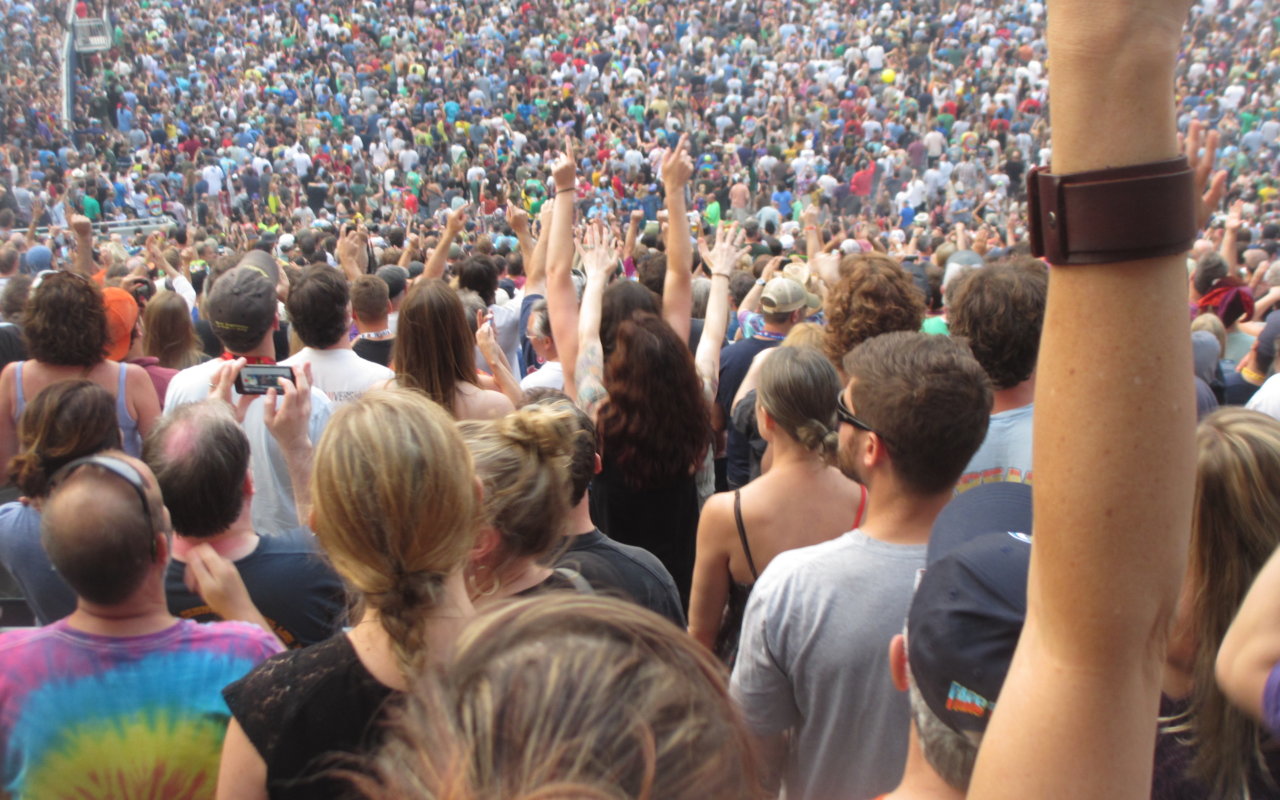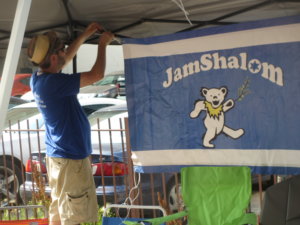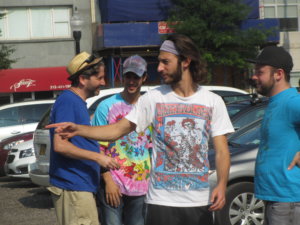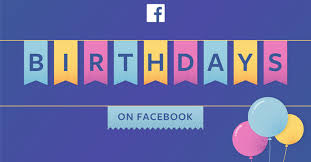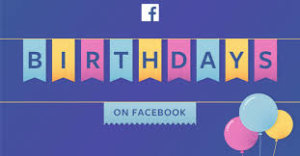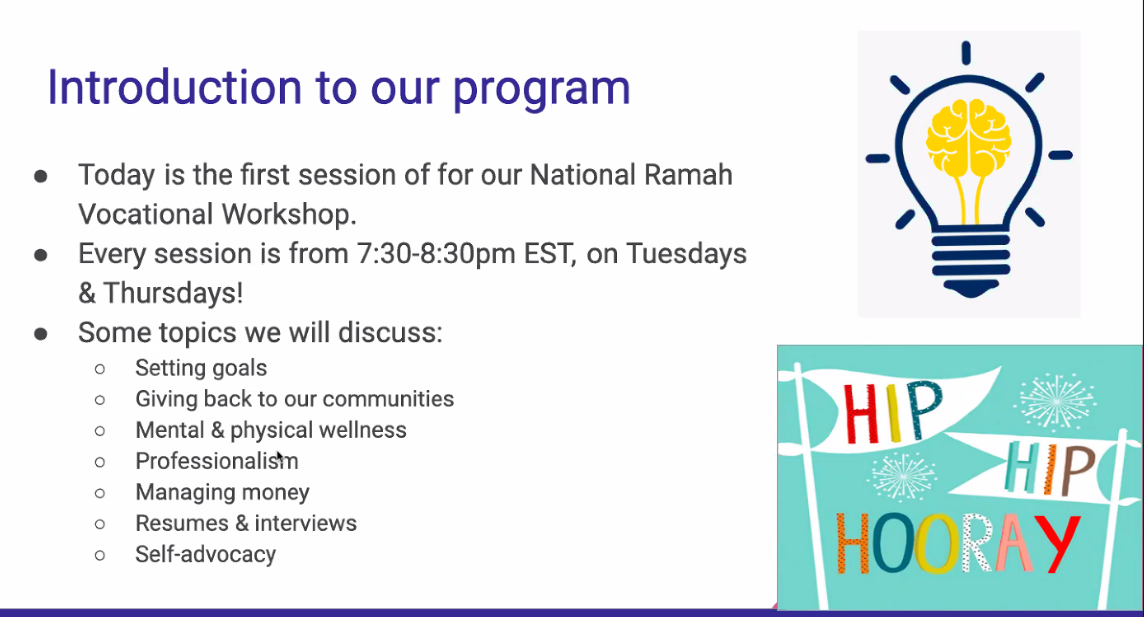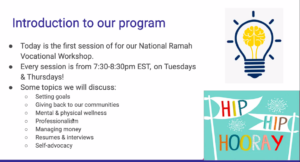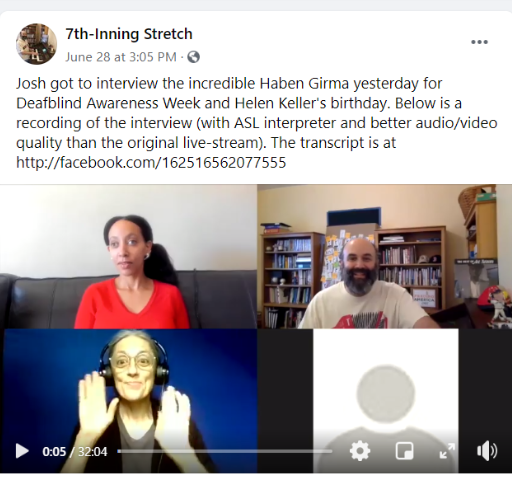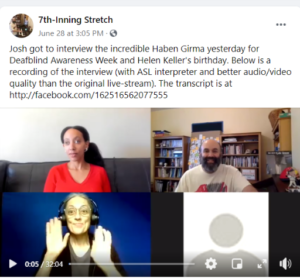I am embarrassed to admit that as I child, I remember people using the term “deaf, dumb and blind.” I am also embarrassed to admit that I only heard of “Deaf-Blind Awareness Week 2020” a few days ago, when it was just ending—and only thanks to a chance interview I saw on Facebook with Haben Girma, the first deaf-blind graduate of Harvard Law School.
According to the Helen Keller National Center for Deaf-Blind Youth and Adults, Deaf-Blind Awareness Week has been observed for 7 days starting the last Sunday in June since 1984. It was this year from June 21st to 27th. The theme this was “Deaf-Blind and Thriving.”
I am a big fan of Josh Kantor, the organist for the Boston Red Sox and his Facebook program “7th Inning Stretch,” where he plays music every day at 3 pm, “until the baseball season starts.” For some reason, I went to the Facebook page and he was interviewing Haben Girma. There was an interpreter on the screen, and Haben’s friend, Gordon was transcribing what Josh said so Haben could read it in Braille. Sally was captioning the discussion as well. There is an audio/video recording of the interview here
Haben Girma’s recent memoir is entitled, “Haben. The Deafblind Woman Who Conquered Harvard Law. A Memoir by Haben Girma.” Her professional work is in several areas including accessibility of digital technologies.
The interview took place on what would have been Helen Keller’s 140th birthday. Girma is one of 30 people to win the American Foundation for the Blind's Helen Keller Achievement Award. Girma spoke about Keller as adult and noted that Helen was often frustrated that most stories capture her as a 7-year-old, and very little depict her in her 40s, 50s or 60s. Girma noted that Keller was a social justice advocacy. “When she tried to inspire people fix racism and other inequalities, they tried to silence her. But she would keep writing. She wrote many books and did many speeches.”
Girma, who spoke in her own voice in the presentation, addressed the issue of people with disabilities and the police. “A lot of times when a deaf person is arrested or has any kind of interaction with the police, there's no communication access. There's no interpreter, there's no captioning. And, that's not justice. So, many are arrested and have no idea what's going on, why they are being arrested. They will go through a trial without interpreters or captioning or any kind of access or they will be put in jail without the ability to talk to a lawyer or family members. It's not justice. And, I know a lot of people say oh, I don't have to worry about that, because I follow the laws. We're not talking about guilt or innocence. We are talking about all interactions with the police. And, that's terrifying for me as a Deafblind person. If an officer shouts something at me, I'm not going to hear it. And there's a good chance they would interpret that as a threat. A lot of police officers expect people to immediately comply. They walk into a situation expecting non-disabled people. And if someone can't move in a certain way, can't hear, can't see, or has an invisible disability like psychiatric disabilities, too many officers interpret that as a threat. And that's a widespread problem; about a third to half of those killed by police are people with disabilities. And a significant number of those are Black people with disabilities. It's extremely dangerous when ableism is multiplied by racism.”
Girma spoke a lot about developments in the tech world which may benefit the deaf-blind community and others with disabilities. She offered important advice to the tech sector: “if you know anyone working on tech, remind them — make it accessible. Hire more disabled engineers to be part of the team. Where teams are diverse and include Black people, disabled people, women in tech, then our products and services will also be stronger and better.”
Kantor asked about Girma’s love for dance, and she spoke of attending a camp for the blind in California, where she had a blind dance instructor. “She showed us there are many different ways to engage with music. She verbally described the different moves, but also, allowed us to touch our feet and feel the different movements. And that's how I was introduced to swing, salsa and merengue. I dance many of the different dances. Guess what. Helen Keller also waltzed and fox-trotted!” In the interview, Girma also shared stories of meeting Stevie Wonder—at the White House!
Girma is an amazing person, a great spokesperson for the deaf-blind community, and a person who has done a lot to help change perceptions of people with disabilities. I hope we will all mark our calendars so we meaningfully mark Deaf Blind Awareness Week—and Helen Keller’s 141st birthday—next year!
Links to General Information on deaf-blindness:
American Association of the Deaf-Blind: http://www.aadb.org/
Helen Keller National Center for Deaf-Blind Youths & Adults: www.helenkeller.org/hknc
National Center on Deaf-Blindness: https://nationaldb.org/
World Federation of the DeafBlind: http://www.wfdb.eu/
National Family Association for Deaf-Blind (NFADB) https://www.nfadb.org/
